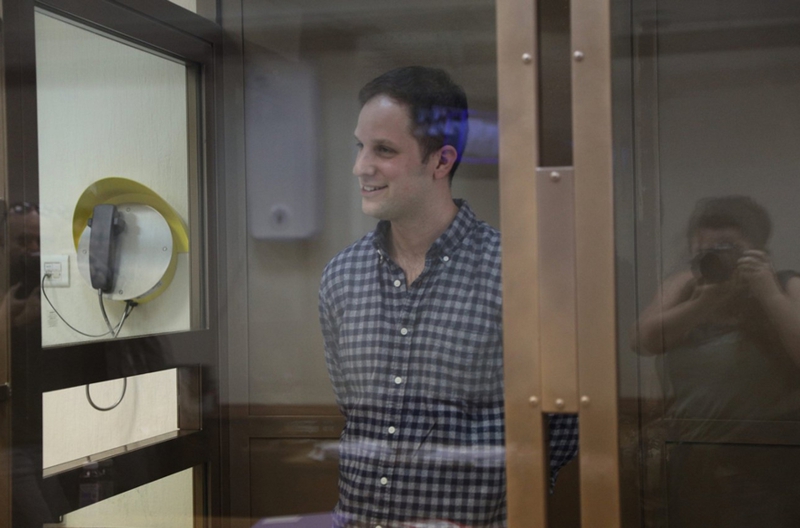Judge Andrei Mineev of the Sverdlovsk Regional Court in the city of Yekaterinburg, who delivered the verdict against Wall Street Journal correspondent Evan Gershkovich, claimed that he was “not rushed by anyone” to issue a decision in the case despite the anticipated prisoner exchange between Russia and the West, according to a report by local outlet It’s My City.
Addressing concerns about the speed of his decision, Mineev remarked at a public talk in Yekaterinburg:
“It's probably disconcerting that this was one of my fastest sentences. But I can say that I type quickly. I’ve delivered even faster verdicts when I worked at the city court, where I had to handle two criminal cases in a single day. You could say the habit stuck with me.”
Gershkovich was handed a 16-year prison sentence by Mineev after being found guilty of espionage on July 19, 2024. The trial — a rushed three-session affair — was held behind closed doors, as is customary for all espionage and treason-related cases in Russia. No media members were present at the hearings. Press freedom groups and The Wall Street Journal consistently condemned Gershkovich's trial as a politically motivated sham.
According to Russian investigators, Gershkovich had allegedly traveled to the Sverdlovsk Region “on the instructions” of the CIA in order to collect secret information about the work of Uralvagonzavod — one of the world’s largest tank manufacturers. He was detained in Yekaterinburg on Mar. 30 last year and was subsequently arrested on suspicion of espionage and “collecting state secrets.” Both the journalist and his employer, The Wall Street Journal, maintained his innocence throughout.
Prior to his arrest, Gershkovich was working on an article on the attitude of the Russian public to the Wagner Group.
Mineev claimed he was “100%, even 200%” certain that Gershkovich was working for the CIA, which apparently made his ruling legitimate. The judge stopped short of providing any details of the case, pointing to the classified nature of the verdict.
American officials disagree. “We have been clear from the get-go that Evan did nothing wrong and should not have been detained,” U.S. State Department spokesperson Vedant Patel told reporters after sentencing. “To date, Russia has provided no evidence of a crime and has failed to justify Evan's continued detention. Evan should not be detained.”
Russian presidential spokesman Dmitry Peskov claimed that Gershkovich was caught “red-handed,” but provided no evidence to support his claim.
Gershkovich, along with former U.S. Marine Paul Whelan and dual U.S.-Russian citizen Alsu Kurmasheva, a reporter for Radio Liberty, returned home on Aug. 1 as part of the biggest prisoner exchange between Russia and the West since the end of the Cold War. It saw the release of 24 people from prisons in six countries — Russia, the U.S., Germany, Norway, Slovenia, and Belarus.
As part of the exchange, Russia received FSB hitman Vadim Krasikov, who murdered former Chechen military commander Zelimkhan Khangoshvili in broad daylight in a Berlin park in Aug. 2019. Seven additional convicted spies and fraudsters also returned home to Russia in the deal.
Notably, Krasikov was convicted in Germany following a joint investigation by The Insider and Bellingcat, which revealed Krasikov’s real name and obtained documents proving he was a member of the Russian intelligence services, after which he was handed a life sentence.
Back in Yekaterinburg, Russia appears to be accumulating a new collection of bargaining chips for future prisoner exchanges. Judge Mineev also reportedly issued the verdict in the case of Ksenia Karelina — a dual U.S.-Russian citizen who was sentenced to 12 years in prison on charges of treason on Aug. 15, 2024. Karelina’s “treason” consisted of sending $51 to the Razom for Ukraine foundation shortly after Russia unleashed its full-scale invasion in Feb. 2022 — a charge to which she pleaded guilty. Razom for Ukraine is a New York-based charity that provides humanitarian aid and disaster relief to Ukrainians affected by the war. The organization has denied any involvement in providing military support for Kyiv and has urged the U.S. government to demand Karelina's release from Russia.
Sentences similar to Karelina's are believed to contribute to Vladimir Putin's “exchange fund” for negotiating the return of Russian spies and criminals imprisoned abroad. Read more on the “exchange fund” in The Insider's report.

